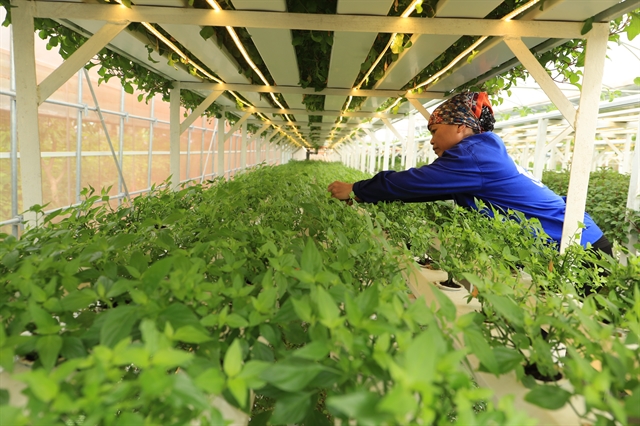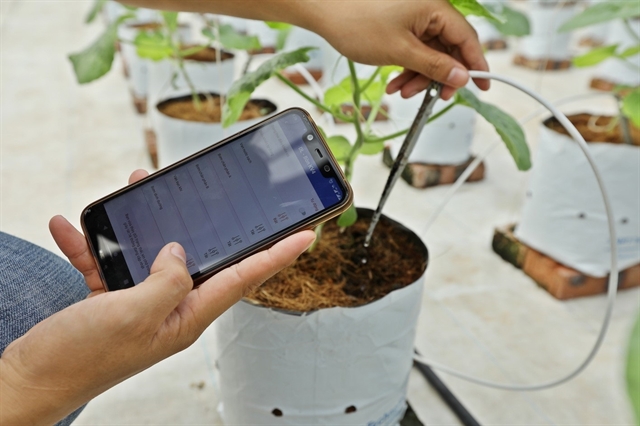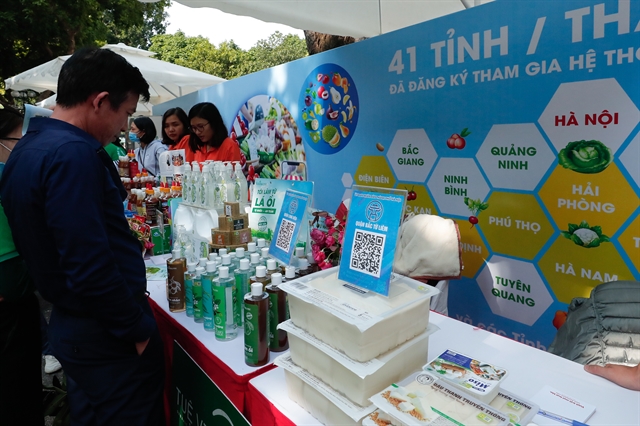 Society
Society

 |
| Super clean vegetable production at a smart agricultural farm in Tiến Xuân Commune of Thạch Thất District. — Photo courtesy of the Hà Nội Department of Agriculture and Rural Development |
HÀ NỘI — The National Target Programme on Building New Rural Areas for the period 2021-25 sets the criteria that new rural communes must have at least one smart new rural village model.
Therefore, localities of Hà Nội are enhancing the construction of modern communes and villages.
Recently, people who have come to Phù Đổng Village 2 of Phù Đổng Commune in Gia Lâm District have been surprised by the way that locals approach information.
People proactively grasp information through social networking systems, instead of receiving information from local authorities through public loudspeakers as before.
The villagers use utility services, such as paying electricity and water bills, and banking transactions through applications.
The local authorities also support people using online public services as well as guide businesses, co-operatives, business households and people to participate in e-commerce platforms such as voso.vn, postmart.vn and use digital platforms and technologies to post photos, promote products, create online booths and receive orders.
According to a survey conducted in Phù Đổng Village, up to 98 per cent of households agreed with the necessity of building a smart village.
This confirmed that the local people are very excited and understand the value of digital transformation in new rural construction.
Liên Hà Commune of Đông Anh District started the construction of a new smart rural model in Hà Lỗ Village. So far, the model has been replicated in all eight villages.
Phạm Văn Nam, chairman of People’s Committee of Liên Hà Commune, said that the commune authority has installed free wifi at all eight villages’ cultural houses and installed security surveillance cameras on main traffic roads.
 |
| Many businesses and agricultural co-operatives in Hà Nội are currently using drip irrigation systems that are connected and controlled via smartphones. — Photo courtesy of the Hà Nội Department of Agriculture and Rural Development |
Liên Hà Commune has coordinated with suppliers to use information technology to access social services such as health, education, culture, etc.
In the commune, there are several models of high-tech application in farming and animal husbandry.
The commune has deployed zoning of concentrated rice production and spraying pesticides by remote control flying vehicles.
The commune completed the construction of a model new rural area at the end of 2022.
Phù Đổng and Liên Hoa are just two of the localities building new smart rural areas in Hà Nội.
Building smart villages is a necessary and sufficient condition to move towards building smart communes, helping the countryside become more modern and improve people's lives.
To build smart rural areas, Hà Nội has been focused on supporting people toward digital transformation in the three main areas of developing a digital government, digital economic entities and a digital society for the community.
Nguyễn Văn Chí, deputy chief office of Co-ordination Office of the New Rural Development Programme in Hà Nội, said: “The set of criteria for the model new rural areas to meet the smart village model includes a community digital technology group; smart communication; e-commerce; smart tourism; and social services.”
“These are new criteria for the National Target Programme on Building New Rural Areas in the 2021-25 period,” Chí said.
Digital transformation is currently the goal that Hà Nội is seeking to implement, and the agricultural sector is no exception.
To build a model new rural area, communes must choose to pilot the programme in one village, then replicate it in other villages, towards building new smart rural communes.
 |
| Hà Nội promotes support for people toward digital transformation in the community. — Photo courtesy of the Hà Nội Department of Agriculture and Rural Development |
Hà Nội is one of the leading localities that supports farmers in digital transformation.
Previously, the city supported farmers in carry out information transparency of agricultural and craft products through the use of QR codes.
From 2021, the Coordination Office of the New Rural Development Programme in Hà Nội has supported and trained farmers to sell online and livestream to introduce products on social networks.
Individuals, co-operatives and businesses in Hà Nội have been proactive in implementing digital transformation for smart production.
For example, farmers in Hồng Sơn Commune of Mỹ Đức District set up a digital technology group with 15 members.
The group’s members come to households to guide people to activate Zalo, and install applications such as VNeID, VssID, e-wallet, and electronic health books.
The city has set a goal that by 2025, Hà Nội will have 100 per cent of districts meeting new rural standards, 40 per cent of communes meeting advanced new rural standards, 20 per cent of communes meeting model new rural standards, and complete the goal of building new rural areas at the city level.
According to the Co-ordination Office of the New Rural Development Programme in Hà Nội, as of August this year, the city has all 382 communes reaching new rural standards, 111 communes earning the title “advanced new-style rural areas”, 20 communes being recognised as model new rural areas, and 15 out of 18 districts and townships meeting the requirements of new rural areas.
The four districts of Đan Phượng, Gia Lâm, Đông Anh and Thanh Trì are eligible to request the Prime Minister to recognise the districts as meeting advanced new rural standards in 2023.
The city’s goal in the period 2021-25 is to build new rural areas in the direction of smart urban development, including some districts elevated into inner-city districts.
Chí said that currently the office is drafting a plan that implements the digital transformation programme in new rural construction towards smart new rural areas in the period 2021-25, and will submit it to the city for review and approval.
In addition, the Hà Nội Department of Agriculture and Rural Development continues to advise the city on setting up mechanisms and policies to encourage organisations and individuals to research and develop digital platforms, digital data and digital services for agriculture and rural development as well as support farmers to promote their role in digital agriculture. — VNS